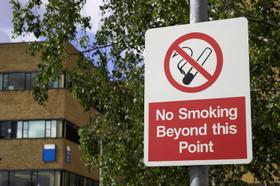Profanity is generally frowned upon at primary and secondary schools across the country. In fact, one high school in Connecticut has issued a policy that allows police to hand out pricey tickets to students caught in the act of cussing. The rule is designed to teach students self-control and prohibit profanity in the school, where it doesn't belong. Despite the $103 price tag, most parents and students at Connecticut High School have supported these tickets, according to a report in the New Haven Register.
Most of us agree with rules against foul language used by kids, but what about when those kids reach college campuses? Aren't they considered adults, capable of making their own choices, even if the words they choose are offensive to people around them?
According to a community college in Mississippi, the answer is a resounding no. This school is cracking down on cussing on campus, and some say they are violating First Amendment rights in the process. One case has garnered the country's attention, putting the usually quiet campus in a bit of a predicament.
This video explains how not to swear.
The Case of Isaac Rosenbloom
According to a report in the Chronicle of Higher Education, Isaac Rosenbloom is a 29-year-old student at Hinds Community College. One day, he and a few other students remained after class to discuss their grades with the professor. Rosenbloom was distressed about the low grade he had received on an assignment that was turned in late. At one point, he turned to a fellow student and told him his grade would "f--- up my entire GPA."
The professor, Barbara Pyle, yelled at Rosenbloom for using such language in front of her and threatened the student with detention. Rosenbloom retorted that there was no detention at Hinds, and Pyle instead sent the student to the dean. She also submitted a disciplinary complaint against Rosenbloom, charging him with "flagrant disrespect."
Rosenbloom was found responsible for the offense, given 12 demerits (three short of suspension), and excluded from Pyle's class for the rest of the term. Rosenbloom appealed the decision, but the appeal was denied. He also presented his case to the Foundation for Individual Rights in Education (FIRE), which is working with Rosenbloom on a final appeal to the president of Hinds, Clyde Muse.
Hinds Policy
An article in USA Today cites the current policy on profanity and Hinds Community College, which states that "public profanity, cursing, and vulgarity" are subject to a fine of $25 for a first offense and $50 for subsequent offenses. The offense of "flagrant disrespect," of which Rosenbloom was accused, is subject to student demerits that can lead to suspension. USA Today could not get a college official to confirm the college policies or comment on the Rosenbloom case.
FIRE representatives assert that Hinds’ policy on profanity and its application in the Rosenbloom case show blatant disregard for students' First Amendment rights. In an article on the FIRE website, FIRE Vice President Robert Shibley said, "It is quite absurd that a college has decided that a 29-year-old man who uses a four-letter word out of frustration after a class should be officially punished. College students don't lose their free speech rights when they arrive on campus. Will Hinds be sending its students to bed without supper next?"
Free Speech and Profanity
According to the First Amendment Center, there are times when profanity can be restricted under the law. These circumstances include:
- Words that are used specifically to "inflict injury or tend to incite an immediate breach of the peace."
- True threats involve "statements with serious expressions of an intent to commit an act of violence."
In addition to these basic principles, there are specific settings where profanity may not be protected by the First Amendment, such as:
- Public schools, where school boards are allowed to determine how and when profanity will be punished
- In the military, commanding officers have the ability to enforce and maintain good order among the ranks
- Broadcast media is not allowed to use profane language and indecent material between the hours of 6 a.m. and 10 p.m.
- Telemarketing, under the telephone harassment laws put in place by many states today
The end of the article on the First Amendment Center website states, "On its face, profane language is not a punishable form of speech."
As the battle continues at Hind Community College, other college campuses may be taking notice. The precedent set at this Mississippi institution may have a bearing on future policies involving cussing on campus across the country.
Questions? Contact us on Facebook. @communitycollegereview















